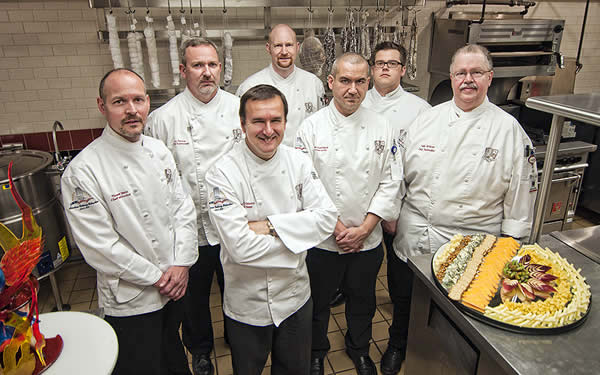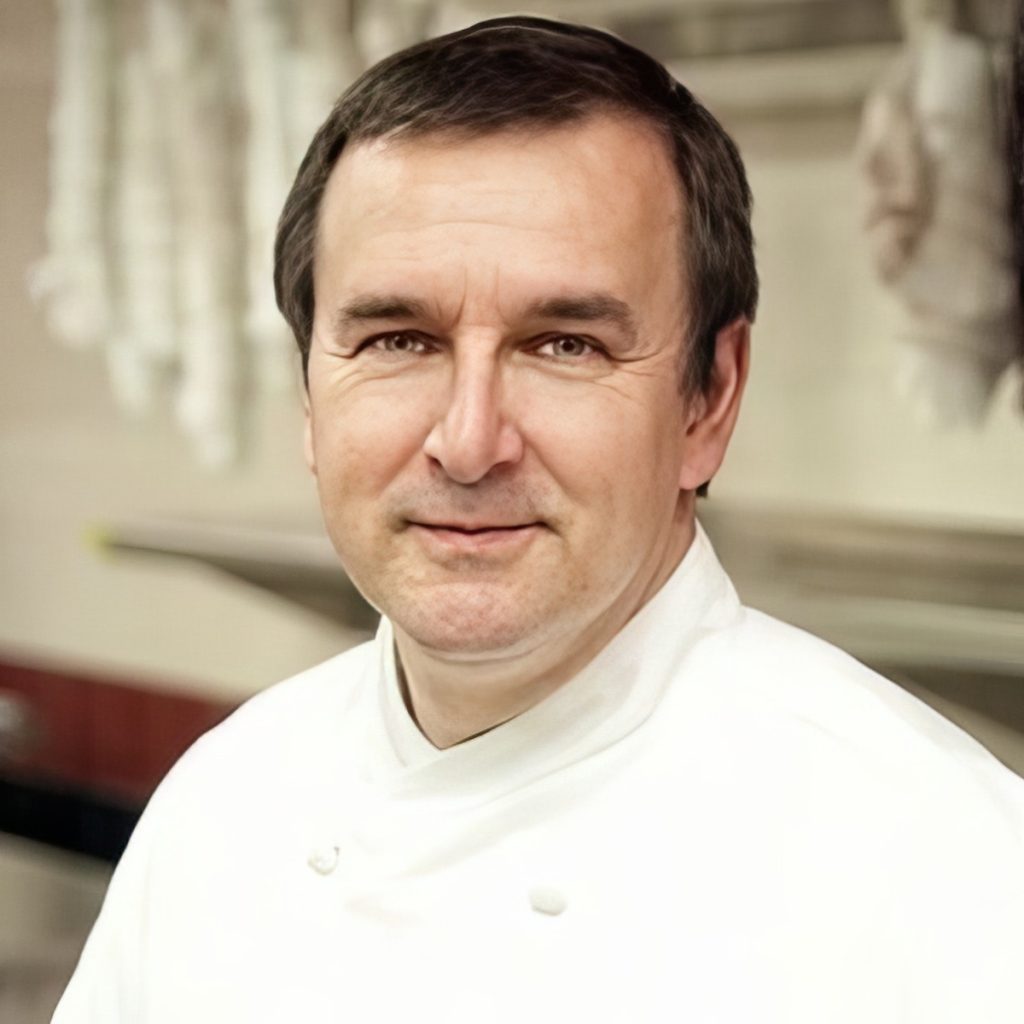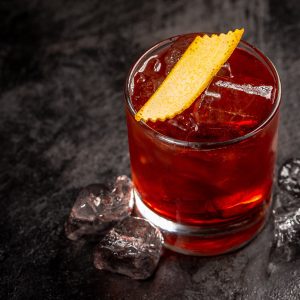I personally believe that you need to be honest, truthful and up front with the student, when guiding them in their culinary career. – Chef Antony Osborne
Interview with Chef Antony Osborne from Culinard
What a treat to interview a renowned Master Pastry Chef who has traveled to 38 countries and worked at some of the finest hotels in the world, including The Dorchester in London, Nasseur Hof Hotel in Germany, and the Palace Hotel in Switzerland.
At only 25 years of age, Chef Osborne was named the youngest Executive Pastry Chef at a leading hotel while working at the Dorchester. He then became the Executive Pastry Chef at The Oriental in Bangkok, Thailand, where he prepared specialty desserts for the Royal Family of Thailand.
While working in Hong Kong at the prestigious Raffles Hotel in Singapore, Chef Osborne worked with celebrity chefs, including Alain Ducasse, Joel Robuchon, and Charlie Trotter. In 2006, Chef Osborne was selected by Pastry Art & Design Magazine as one of the top 10 pastry chefs in America.
Chef Osborne is now the Dean of Culinard—The Culinary Institute of Virginia College. If you are thinking of attending culinary school, you’ll want to read his answers to my questions about what it takes to succeed in the restaurant industry.
Now you can understand why I am so excited to share this interview with you.
Here’s my interview with Chef Osborne:
Hi Chef Osborne, thank you for participating in my Novice2Pro interview. These interviews are a great way for my readers to get to know more about you and the Culinard culinary program.
Chef, you were mentioned as having seven years of college education in the Culinary Arts. Where did you study to become a Pastry Chef? What types of degrees did you graduate with?
I actually have 15 years of educational experience; the majorities are diploma’s completed with the City & Guilds in London. These were full time courses taken at various colleges around the country, starting with the basic Culinary foundation courses taught at Haverfordwest Technical College, Pembrokeshire, then the specialty courses at Ealing (Wedding Cakes and Bread baking) and finally Westminster College (Pastry Masters) in London and Slough Polytechnic College (Pastry Masters part 2).
The reason to attend such a wide range of colleges, was simple to become a leading pastry chef, I felt that I needed to work with the best educational programs that where currently available in the United Kingdom. I also completed my certificate and higher diploma in wines, spirits & liqueurs from the Wine & Spirit Educational Trust, at the Mansion House in the City of London.
When I relocated to work in the United States, I completed my Culinary Associate Degree at Culinard, the Culinary Institute of Virginia College and not long ago finished my Bachelors of Science Degree in Hospitality Management at Sullivan University, Kentucky. I am currently taking a break from my studies, but intend to work on my Masters of business early next year.
As someone with extensive knowledge in the culinary field, what led you to become a Pastry Chef rather than a Chef? In other words, what about being a Pastry Chef appealed to you?
Perhaps this seems rather corny, but I have never wanted to be anything else other than a Pastry Chef. Ever since a young age, I would regularly be in my mother’s kitchen preparing meals for my parents to tryout. I began by preparing the basic things, such as cooking breakfast for my parents, to preparing simple pastries and desserts from a children’s cook book. I was born with a passion and love to cook.
I have always had a passion for Pastry, it really completes me. It allows me to showcase my skills, be creative and now provide knowledge and hopefully inspire others to reach their goals. Today, many potential chefs get encouraged from viewing the Food Network but in my younger days, I drew inspiration from my enlarged family, and later from the celebrity pastry chefs of the day.
You have spent much of your career studying and working abroad in Germany, Thailand and China. How did traveling and working in such diverse regions of the globe become a critical part of your career?
That is a great question, one that taught the boy to become a man. If there is anything I can say to influence today’s pastry Chefs to be successful, would be besides being dedicated to the craft and hard working, make sure you have competent people skills. As without this, you are going nowhere.
Asia provided so many valuable lessons for me. Here are a few examples. First, I had my experience in the Oriental in Thailand. When I arrived there, the majority of my pastry brigade were old enough to be my parents, and here I was, the raw recruit hired from Europe, chosen to lead them.
Having mutual respect for your fellow man and learning to have an open dialog with your employees, where they have a say, helps foster a healthy work environment that can take you to places you can only dream about. I was blessed and extremely fortunate to have worked at this hotel at the time it became the number one hotel in the world for ten straight years for customer service and hospitality standards. It proved a valuable experience for me.
Secondly, I had an experience at the Raffles Hotel in Singapore. It was here that I began teaching a sixteen-year-old girl to become my Sous Chef at eighteen years of age, and the vast majority of fifty pastry employees were young women under twenty years of age. Believing in your team and being a role model and leader helps inspire not only them but also me.
Having worked in Asia for some 15 years and Europe for 10, I was fortunate to come into contact with so many different people and their cultures, which became a vital resource that enriched me and provided so many valuable lessons that have stood me in good stead for my future career.
Does baking and pastry/dessert making differ in the Far East than it does in the Western Hemisphere? What techniques, ingredients, and flavors did you begin to incorporate into your Pastry Chef repertoire after working throughout the globe?
In my early days of working in the Far East, Asian hotels were embracing the European style of pastries and techniques. However, one should not forget the incredible background and history that this continent has with its own cooking methods, which have stood the test of time for centuries. These were still applied in people’s everyday lives when I was there, just as they continue to do so today.
There is a difference between both cultures, and this is reflected both in the cooking skills, techniques and ingredients. As we become more of a global civilization, we are learning to embrace other people’s cultures and foods, which have given rise to new styles of cuisines such as Pacific Rim, Asian Fusion, Latino, Regional Chinese and East African cuisines. Today we are seeing a balance of the best of both being applied, not only in Asian hotels and restaurants, but also around the world.
As a corporate pastry chef, I had a responsibility to provide pastries and desserts that made tourists feel comfortable and fulfill their expectations, but at the same time showcase the creative assets, techniques and ingredients of the Asian countries that they were visiting.
While working at the Dorchester in London, you were the youngest Executive Pastry Chef in the world at only 25 years old. Wow, how did you manage to accomplish this? What were your main responsibilities as Executive Pastry Chef there?
This was I suppose, you would call it destiny. It certainly was not planned and I was not expecting to take this position at such a young age. I was currently working in the hotels first Michelin star restaurant at The Terrace and we were getting rave reviews about our food and service. However, my Pastry Chef and mentor Francois decided he wanted some quality time with his family and wished to step down from his position in the kitchen.
I was then approached by the Executive Chef to take over the department. After thinking the position through, I decided I would only take the position if Francois would agree to continue and be my assistant. Although I realized this was rather a unique situation, this provided the best of both worlds not only for the Hotel, but also me and Francois. This supported me with experience and expertise, which led to a highly successful partnership.
My responsibilities followed the traditional responsibilities of a Pastry Chef, such as menu planning, training, researching new techniques and pastry trends, setting budget to ordering supplies and ingredients.
I realize being so young that many people may question this appointment, which at the time was a real surprise, when you consider many pastry chefs were in their forties. I would like to think that this was due to my education as well as my work experience, hard work and the belief and support of my senior leaders within the kitchen, which made this option viable.
What was it like to work at The Oriental in Bangkok, Thailand; often considered the number one hotel in the world? What types of specialty desserts were you preparing for the Royal Family of Thailand and other notable people that frequented the hotel?
Working at the Oriental was unique and inspiring. It provided a culinary and pastry education that you can only dream about. We worked hard and played hard, working twelve hour days, six days a week. It also provided the opportunity for me to meet many Royals, dignitaries and celebrities, such as The Royal Family of Thailand, The Sultan of Brunei, Princess Diana and Prince Charles, George Bush, Ravi Ghandi to Liz Taylor and Annie Lennox as well as affording me the opportunity to work with many of the leading Chefs of the world such as Alain Ducasse, Georges Blanc, Michel Trois Gros, and Alice Waters, to name a few.
Many of the State Visits which I catered for at the Grand Palace, were French based and sometimes these were requested from the Ministry of Foreign Affairs. On others, it was based on dietary needs, or a decision simply taken between the Executive Chef and myself. These usually encompassed the desserts trends and ingredients of the day, such as a chocolate marquis made with Valrhona dark chocolate or using local ingredients such as a refreshing orange and lychee sorbet, to a Pandan and Red Bean Crème Brulee or pink guava cake.

You were awarded several times for your work throughout Asia, including Best National Team at the Singapore Salon Culinaire and the Golden Lion Award. What qualifies a person to achieve these awards? How did winning these awards impact your career?
Winning a competition does not simply qualify you as a Pastry Chef, but the experience most certainly better prepares you for the position. Over the years, I have gone through the school of hard knocks and also enjoyed several successes. It is through such occasions that the valuable learning process begins. The more you participate in such competitions, the better competitor you become, which hopefully will inspire confidence. I believe competition is part of becoming a good pastry chef and contributes to industry recognition to your peers and culinary colleagues.
For the past several years you have been a guest chef at the Walt Disney World theme park Epcot’s “Party of the Senses.” What goes on at this event? Which “country” inside Epcot do you best suit for? How did you become a part of this experience?
My introduction to Epcot’s Party of the Senses was through Disney’s former Corporate Chef, Franz Kranzfelder. Franz was my former Chef when we worked together at the Hilton Hotel in Hong Kong. Franz invited me to give a two-day seminar to all the pastry Chefs working at DisneyWorld in Florida, and our relationship has grown from there.
The event is the largest Food and wine Festival in the World. In addition to the Party of the Senses event, many activities take place, such as cooking demonstrations, food and wine dinners with celebrity chefs, wine tastings, and mini signature food tastings in various countries located throughout Epcot.
I have a very strong Asian background, which is why I am featured here. This year, my new signature dessert will be a Thai Coconut and pandan chiffon cake, served with shredded pineapple and Dark Chocolate Kulfi Ice Cream.
Now, you are Dean of Culinard at the Culinary Institute of Virginia College. What brought you from a world-traveling Master Pastry Chef to Dean of a Culinary Institute?
I believe fate has brought me here. After being blessed to have accomplished so much with my pastry career, I wanted to give something back to my wife and son, who diligently supported this career. I want to spend more quality time with them and move in a new direction that would allow me to hopefully help the young culinarians of today be successful in their own career goals.
How did you transition from being in the kitchen to teaching?
You have to be receptive to the move, willing to learn new ideas, and realistic about the changes being made.
Can you tell us about the culinary program at Culinard?
The Culinary Program is currently a fast-track foundation program that allows students to enter the hospitality field early. Afterward, if they so wish, they can continue their studies online while still working in the industry.
Culinard is also the first program in the country to have a customized version of My Culinary Lab, which is essentially an interactive web-based learning system for the introductory cooking course. This is very popular with our students. The program also follows the skills and competencies set out by the American Culinary Federation.
How does the Culinard differ from other culinary schools and make it a respected institution?
I believe several factors contribute to the school’s reputation and overall success. I would like to think that we provide more hands-on instruction with smaller classes, which provides a more intimate learning environment for our students. We take a proactive approach that allows us to incorporate the latest industry trends into our curriculum.
We pride ourselves on the quality ingredients used for the program, such as purchasing fresh fish, which is delivered fresh from the Atlanta fish market overnight. We work closely with the local organic farms and have an agreement in place for them to produce fresh herbs for the college.
We have an international faculty with a broad base of food service experience from around the world. All of our instructors are passionate, knowledgeable and dedicated to their craft and the culinary education of our students. They are all required to be Certified Executive Chefs or Pastry Chefs with the American Culinary Federation.
We have built a good working relationship with our externship sites and employers, which opens many doors for our culinary students. As a college, it is important to recognize that the student is our employer and needs to be treated as such. Ultimately, it is the student who carries the name of the program and the grads who are sent out into the industry who reflect upon the quality and standards of that institution.
What would you like to see your students take away from their culinary education after they graduate from Culinard?
I hope that our students have enjoyed their education and found it to be a valuable learning experience, which will stand them in good stead as they work towards their own personal goals. Ultimately, we would all like to see our students be successful in their careers and that our program has contributed to this. If we have done our job professionally and provided a well-rounded education for our students, I will be happy.
As Dean at Culinard, what are your main responsibilities? How do you help prepare and mentor students for their future careers in the culinary world? Are you leading any of the class sessions yourself?
The responsibilities include the planning, strategic direction and general leadership of the program. This past year, I have been working with the Pearson Book Company, customizing My Culinary Lab (inter-active web-based learning system). This has been highly challenging, but also rewarding. We can provide a state-of-the-art educational tool for our students. My other responsibilities include program development, Accreditation, instructional excellence, budgets and student satisfaction.
I personally believe that you need to be honest, truthful, and up front with the students when guiding them in their culinary careers. They may not like to hear everything that you tell them, but being honest and providing real-world experience will hopefully help them better understand the hospitality industry.
I also remind them that they have a responsibility to put forth the effort and embrace learning; otherwise, they will become innocent bystanders waiting for that train that never arrives. Currently, I am not teaching, although I am responsible for mingling and talking to all my classes each day.
How crucial are culinary externships to a student’s overall culinary education? How do you incorporate these into the curriculum at Culinard?
Externships enhance the culinary education of the program and play a vital role by providing real-world experience for our students. They also provide an introduction and insight into the hospitality industry.
Externships are incorporated at the end of the students’ training, which in our case is the third quarter. This allows them to showcase the skills and competencies that they have learned during their time with us and also provides the opportunity to further refine those skills in a real-world setting.
If a high school student came to you and told you they were interested in working in the culinary field, what would you say to them? How should they prepare themselves for this exciting career path?
I would sit down privately with them and first ask what they know about the industry and their aspirations. I would provide an insight into the inner workings of the trade and provide them with an honest reflection about the industry, ranging from the challenging times such as the long work hours, covering public holidays, fast pace, etc. To the unique features of the industry, providing pleasure to your clients, meeting famous people, the opportunity to learn new techniques and skills, and showcasing your creative talents.
The student should think carefully before considering the industry; you must be passionate, dedicated, and hard-working. I recommend that they get a good education and thoroughly do their homework before deciding on their college of choice. I would also suggest that the student consider whether they can make the commitment to complete the program before starting. Remember, what you put in is what you get out! No one is going to do the work for you.
High school education is very close to my heart, and I have been working with Mrs. Judy Brown from the Alabama Department of Education for some five years. I host the annual FCCLA (Family, Career, and Community Leaders of America) high school cooking competition and support her with educational activities.
What were your favorite cookbooks or culinary reads while working and studying in the culinary arts? And now, today, what do you find yourself reading?
One of my favorite books is The International Confectioner. Its wonderful array of techniques, knowledge, and recipes (that actually worked) gives me immense pleasure. It also became a trend setter in the pastry world at that time.
As a culinary novice, I really enjoyed reading Practical Cookery. This book laid out the foundations of cooking in a simplistic manner that made it easy to navigate and execute the recipes.
I rather enjoy my Sunday afternoons pursuing the book shelves at one of the local libraries, looking at Culinary or pastry magazines and books. One of my favorite haunts is the new Library in the Forest in Vestavia Hills, which is set in a wonderful, tranquil, and garden-like setting. It really allows me to relax and enjoy a quiet moment, where I am at peace with the world, taking in a new book or learning about a new technique from the Pastry world.
With so many accomplishments, do you still have aspirations you hope to achieve one day in your career?
One of my mottos was learned from working alongside some of the finest hospitality professionals in the world; was never become complacent and always challenge yourself everyday to do something to improve your daily life or the lives of others.
As the Dean of a culinary school, I am most certainly very challenging, but it provides the opportunity to help people change their lives. I am also responsible for providing the best education for my young son and to support and help him grow to fulfill his own destiny.
I still have aspirations that I feel will help my future development and that is returning to my studies at Sullivan University to complete my Masters in business. Currently, I am the new President of the Birmingham Originals (free standing independent restaurants of Birmingham) and my goal is to help our members to grow, hopefully be successful and to help educate the public about these unique restaurateurs.
I am also a believer in giving back to others who are less fortunate and take time from my schedule to work with my good friend Dr.Luis Pineda on his Cooking with Cancer program. This year, we are working on a project to offer a series of cooking demonstrations to cancer patients at the University of Alabama, Birmingham hoping to make a difference in their lives.
The Birmingham Originals have taken the initiative to give back and are hoping to make a significant donation from some of our events to help Children’s Hospital and the poor unfortunate victims who suffered during the recent tornado’s here in Alabama.







